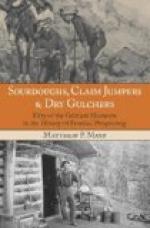Behind them the Hills lay, dark with the everlasting greenery of the North—even, low, with only sun-browned Harney to raise its cliff-like front above the rest of the range. As though by a common impulse they reined in their horses and looked back.
“I wonder just where the Rock is?” she mused.
They tried to guess at its location.
The treeless ridge on which they were now standing ran like a belt outside the Hills. They journeyed along its summit until late in the afternoon, and then all at once found the city of Rapid lying below them at the mouth of a mighty canon, like a toy village on fine velvet brown.
In the city they separated, Mary going to the McPhersons’, Bennington to the hotel. It was now near to sunset, so it was agreed that Bennington was to come round the following morning to get her. At the hotel Bennington spent an interesting evening viewing the pioneers with their variety of costume, manners, and speech. He heard many good stories, humorous and blood-curdling, and it was very late before he finally got to bed.
The immediate consequence was that he was equally late to breakfast. He hurried through that meal and stepped out into the street, with the intention of hastening to Dr. McPherson’s for Mary, but this he found to be impossible because of the overcrowded condition of the streets. The sports of the day had already begun. From curb to curb the way was jammed with a dense mass of men, women, and children, through whom he had to worm his way. After ten feet of this, he heard his name called, and looking up, caught sight of Mary herself, perched on a dry-goods box, frantically waving a handkerchief in his direction.
“You’re a nice one!” she cried in mock reproach as he struggled toward her. Her eyes were bright and her cheeks flew red signals of enjoyment.
Bennington explained.
“I know. Well, it didn’t matter, any way. I just captured this box. Climb up. There’s room. I’ve lost the doctor and Mrs. McPherson already.”
Two mounted men, decorated with huge tin marshals’ badges, rode slowly along forcing the crowd back to the right and to the left. The first horse race was on. Suddenly there was an eager scramble, a cloud of dust, a swift impression of dim ghostlike figures. It was over. The crowd flowed into the street again.
The two pressed together, hand in hand, on the top of the dry-goods box. They laughed at each other and everything. Something beautiful was very near to them, for this was the Pioneer’s Picnic, and both remembered that the Pioneer’s Picnic marked the limit of many things.
“What’s next? What’s next?” she called excitedly to a tall young cattleman.
The cowboy looked up at her, and his face relaxed into a pleased smile.
“Why, it’s a drillin’ match over in the next street, miss,” he answered politely. “You’d better run right along over and get a good place.” He glanced at de Laney, smiled again, and turned away, apparently to follow his own advice.




